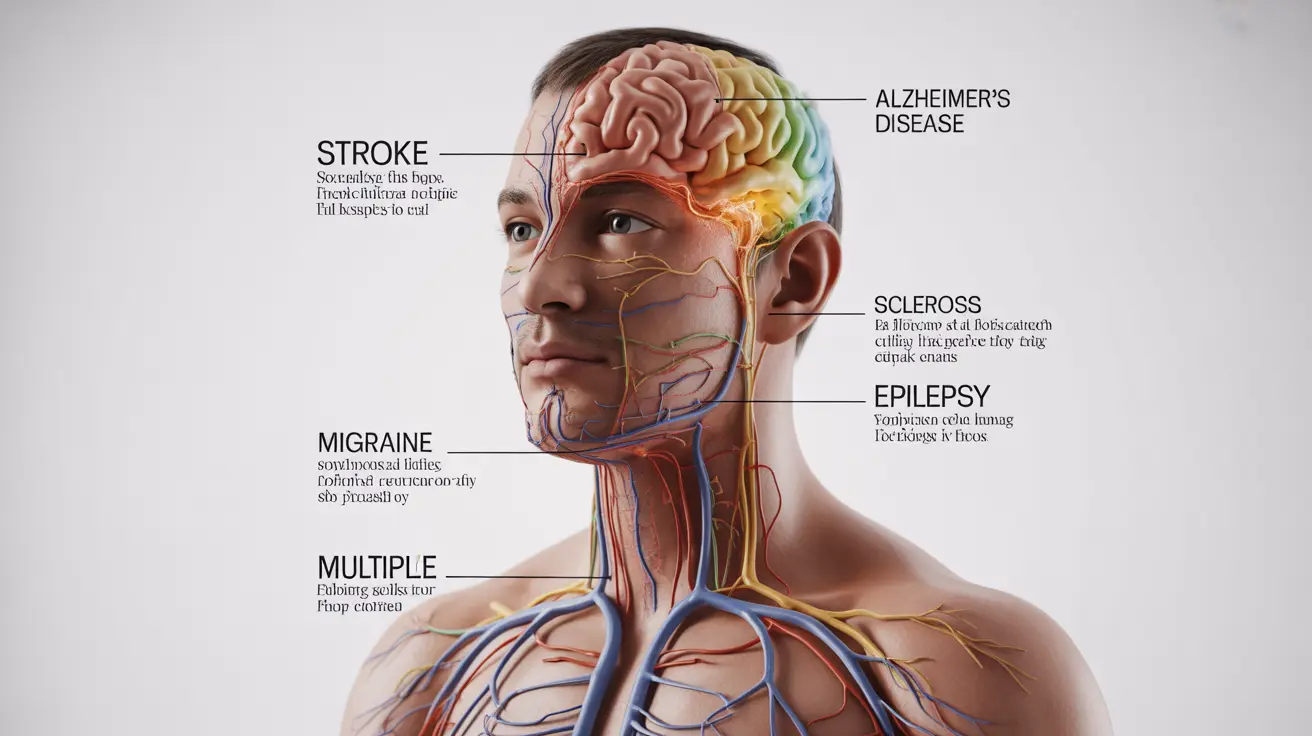The nervous system is our body's complex command center, controlling everything from conscious movements to unconscious processes like breathing. When diseases affect this vital system, they can have profound impacts on daily life. Understanding five major nervous system diseases - stroke, Alzheimer's disease, migraine, multiple sclerosis, and epilepsy - is crucial for early recognition and proper medical care.
Common Symptoms of Neurological Diseases
Each nervous system disease presents with distinct symptoms, though some warning signs commonly overlap. Early detection often relies on recognizing these key indicators:
Physical Symptoms
- Muscle weakness or paralysis
- Coordination problems and difficulty walking
- Tremors or involuntary movements
- Severe headaches
- Vision changes or loss
- Speech difficulties
Cognitive and Behavioral Changes
- Memory loss or confusion
- Mood changes and depression
- Difficulty concentrating
- Personality changes
- Problems with decision-making
Understanding Major Nervous System Diseases
Stroke
A stroke occurs when blood flow to the brain is interrupted, either by a blockage (ischemic stroke) or bleeding (hemorrhagic stroke). Immediate symptoms include facial drooping, arm weakness, and speech difficulties. Quick medical intervention is crucial for better outcomes.
Alzheimer's Disease
This progressive condition primarily affects memory and cognitive function. Early signs include difficulty remembering recent events, confusion about time or place, and challenges with daily tasks. The disease gradually impacts all aspects of cognitive function.
Migraine
More than just a headache, migraines can cause intense throbbing pain, sensitivity to light and sound, nausea, and visual disturbances called auras. They can be triggered by various factors including stress, certain foods, or hormonal changes.
Multiple Sclerosis (MS)
MS is an autoimmune condition where the body attacks the protective covering of nerve fibers. Symptoms vary widely but often include fatigue, difficulty walking, vision problems, and numbness or tingling in various parts of the body.
Epilepsy
Characterized by recurrent seizures, epilepsy can manifest in different ways, from brief staring spells to full-body convulsions. The condition may be genetic or result from brain injury.
Prevention and Lifestyle Modifications
While some neurological conditions can't be prevented, certain lifestyle choices may reduce risk:
- Regular physical exercise
- Healthy diet rich in antioxidants
- Adequate sleep
- Stress management
- Blood pressure control
- Regular medical check-ups
Frequently Asked Questions
What are the most common symptoms to watch for in diseases affecting the nervous system?
Common warning signs include unexpected muscle weakness, severe headaches, confusion, memory problems, coordination difficulties, vision changes, and speech problems. Any sudden onset of these symptoms requires immediate medical attention.
What causes stroke, Alzheimer's disease, migraine, multiple sclerosis, and epilepsy?
These conditions have different causes: strokes result from blood flow problems, Alzheimer's involves protein accumulation in the brain, migraines have genetic and environmental triggers, MS is autoimmune-related, and epilepsy can be genetic or acquired through brain injury.
How are these five major nervous system diseases typically diagnosed and treated?
Diagnosis usually involves a combination of physical examination, medical history, imaging (MRI, CT scans), and specific diagnostic tests. Treatments vary by condition but may include medications, lifestyle changes, physical therapy, and in some cases, surgery.
Can lifestyle changes or prevention strategies reduce the risk of common neurological diseases?
Yes, maintaining a healthy lifestyle through regular exercise, proper nutrition, stress management, and avoiding smoking can help reduce the risk of many neurological conditions. Regular medical check-ups can also aid in early detection.
What are the differences in symptoms and progression between Alzheimer's disease and other dementias?
Alzheimer's typically begins with memory loss and gradually affects other cognitive functions. Other dementias may start with different symptoms, such as behavior changes in frontotemporal dementia or movement problems in vascular dementia. The progression rate and pattern vary among different types of dementia.




